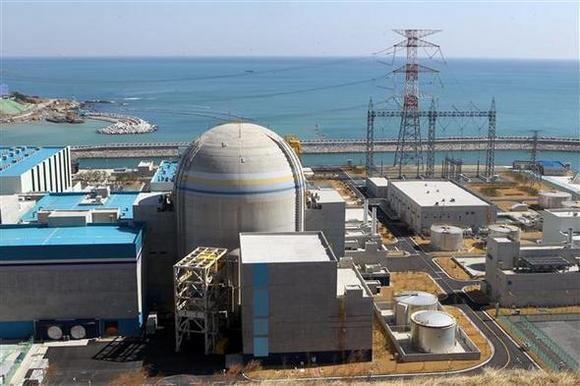hankyoreh
Links to other country sites 다른 나라 사이트 링크
Reliance on nuclear power expected to rise

By Hwangbo Yon, staff reporter
The South Korean government has set a target level of 29% reliance on nuclear power by 2035.
The move, signaling that President Park Geun-hye intends to follow in the footsteps of predecessor Lee Myung-bak in increasing use of nuclear power, is expected to lead to serious controversy.
The Ministry of Trade, Industry and Energy (MITE) submitted its second basic energy plan for 2013-2035 at a plenary session of the National Assembly Trade, Industry and Energy Committee on Dec. 10. It also plans to hold a public hearing on Dec. 11 to gather opinions.
The energy plan is set to go through Cabinet review before final adoption within the month. It is expected to provide a first look at the contours of the Park administration’s policy approach to energy, including nuclear power.
The MITE plan is centered squarely on expanding the use of nuclear power.
As recently as the February announcement of a basic energy supply plan for 2013-2027 back in February, the administration was maintaining a reserved stance on building any new nuclear power plants. A decision on four new reactors between 2025 and 2027 was put off until announcing the second basic energy plan due to anti-nuclear sentiment in the wake of Japan’s 2011 Fukushima disaster. A government-civilian working group issued a recommendation putting the level of nuclear power reliance between 22% and 29%, calling for reductions from the Lee administration’s target level of 41%.
But now the government appears committed to going ahead with new nuclear facilities, noting that Japan has already restarted its own. The basic plan adopted the 29% limit from the working group recommendation. Signs are also pointing to a continued focus on immediate results over power plant safety.
At the moment, nuclear power accounts for 26.4% of all South Korea’s power generation facilities.
The MITE stressed a fairly major role for nuclear power in data submitted to the National Assembly, couched in terms about “putting an end to the excessive expansions and sudden reductions in nuclear power and recognizing its role.”
Vice minister Han Jin-hyun repeatedly noted the changes observed in Japan and other countries, saying a 29% nuclear power reliance level was necessary to avoid industry competitiveness being hurt by rising electricity prices, and to achieve greenhouse gas reduction targets.
The government plan’s projected a 0.9% annual rise in final energy demand, taking it from 200.6 million tons of oil equivalent (TOE) in 2011 to 254.1 million TOE in 2035. Electricity demand is expected to rise the fastest, at an annual rate of 2.5%, with a projected increase from 39.1 million TOE in 2011 to 70.2 million by 2035.
But the government’s current plan is to check the percentage of electricity at 27% of final energy. If adopted, the levels would only seem to suggest a reduction from the 41% reliance on nuclear power given by the Lee administration in 2008. In reality, the projected increase in electricity demand over previous predictions would mean no actual change at all.
Achieving a 29% reliance on nuclear power by 2035 would require the building of around seven new plants in addition to the 23 that are now on line and the eleven that are currently being built or planned. At the moment, five reactors are under construction (a second at Shinwolseong, a third and fourth at Shinkori, and two new ones at Shinhanul) and another six are in the planning stages (fifth through eighth reactors and Shinkori and two additional ones at Shinhanul). Keeping to the plan would require even more in addition to these.
The MITE remained quiet on the issue of additional construction, despite heavy criticisms from many lawmakers.
“We’re already seeing reports in the press about building another six to eight reactors [in addition to the ones currently being planned],” said lawmaker Kim Je-nam. “Everybody knows, but the administration keeps trying to avoid giving an answer.”
Please direct questions or comments to [english@hani.co.kr]

Editorial・opinion
![[Column] Park Geun-hye déjà vu in Yoon Suk-yeol [Column] Park Geun-hye déjà vu in Yoon Suk-yeol](https://flexible.img.hani.co.kr/flexible/normal/500/300/imgdb/original/2024/0424/651713945113788.jpg) [Column] Park Geun-hye déjà vu in Yoon Suk-yeol
[Column] Park Geun-hye déjà vu in Yoon Suk-yeol![[Editorial] New weight of N. Korea’s nuclear threats makes dialogue all the more urgent [Editorial] New weight of N. Korea’s nuclear threats makes dialogue all the more urgent](https://flexible.img.hani.co.kr/flexible/normal/500/300/imgdb/original/2024/0424/7317139454662664.jpg) [Editorial] New weight of N. Korea’s nuclear threats makes dialogue all the more urgent
[Editorial] New weight of N. Korea’s nuclear threats makes dialogue all the more urgent- [Guest essay] The real reason Korea’s new right wants to dub Rhee a founding father
- [Column] ‘Choson’: Is it time we start referring to N. Korea in its own terms?
- [Editorial] Japan’s rewriting of history with Korea has gone too far
- [Column] The president’s questionable capacity for dialogue
- [Column] Are chaebol firms just pizza pies for families to divvy up as they please?
- [Column] Has Korea, too, crossed the Rubicon on China?
- [Correspondent’s column] In Japan’s alliance with US, echoes of its past alliances with UK
- [Editorial] Does Yoon think the Korean public is wrong?
Most viewed articles
- 1‘We must say no’: Seoul defense chief on Korean, USFK involvement in hypothetical Taiwan crisis
- 2N. Korean delegation’s trip to Iran shows how Pyongyang is leveraging ties with Moscow
- 3‘Weddingflation’ breaks the bank for Korean couples-to-be
- 4Korea sees more deaths than births for 52nd consecutive month in February
- 546% of cases of violence against women in Korea perpetrated by intimate partner, study finds
- 6Will NewJeans end up collateral damage in internal feud at K-pop juggernaut Hybe?
- 7[Column] Park Geun-hye déjà vu in Yoon Suk-yeol
- 8[Editorial] New weight of N. Korea’s nuclear threats makes dialogue all the more urgent
- 9Amnesty notes ‘erosion’ of freedom of expression in Korea in annual human rights report
- 10“Parental care contracts” increasingly common in South Korea